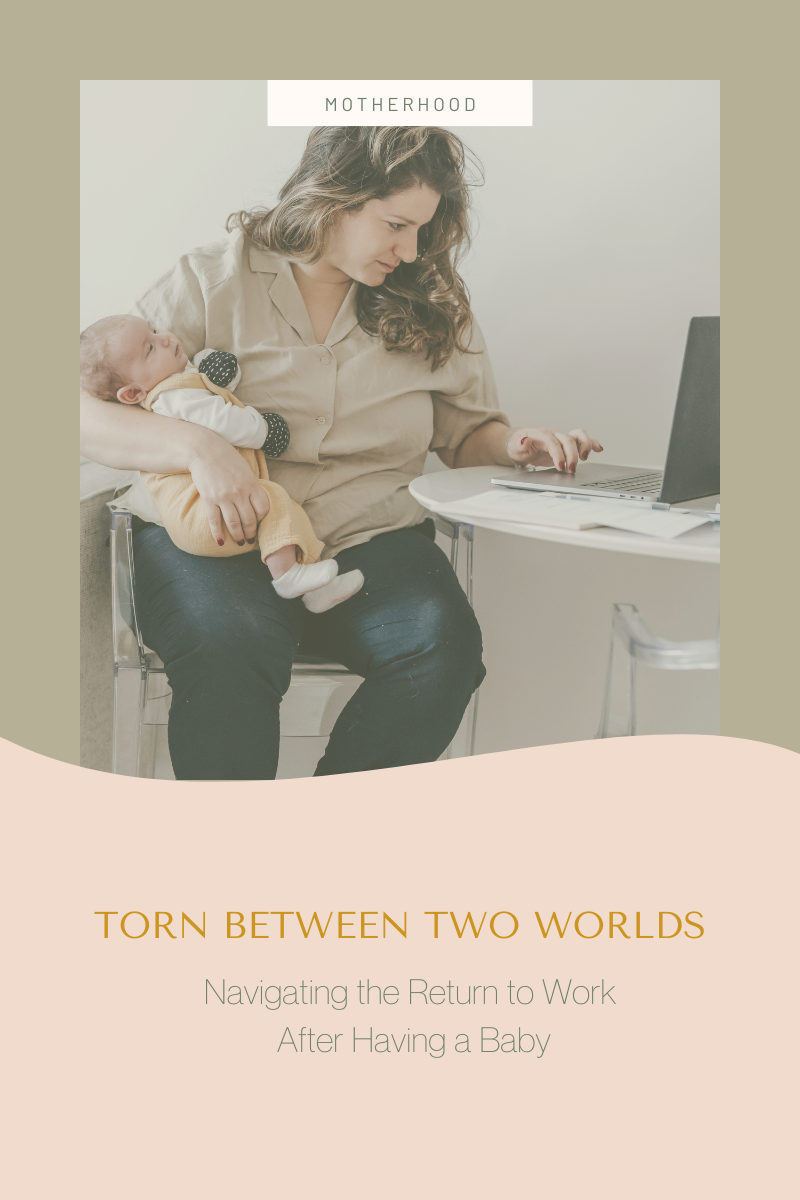Torn Between Two Worlds: Navigating the Return to Work After Having a Baby
Returning to work after having a baby can be an emotionally, mentally and physically challenging transition. Whether it’s your first time or you’ve done it before with older children, this period is often marked by a whirlwind of emotions - guilt, anxiety, uncertainty, and sadness, but also excitement, relief, and a renewed sense of purpose. While many of us long for the ‘best of both worlds’ - quality time with our little ones alongside success in our careers - it can often feel like the ‘worst of both worlds,’ especially in those early days of returning to work. We may feel like we’re missing out on precious moments with our babies while struggling to regain our footing in the workplace.
For me, each return to work was an emotional rollercoaster, but each experience was different. After my eldest son, I felt excited and ready. I was eager to reconnect with adult company and escape some of the monotony that can come with parenting a newborn. I was looking forward to challenging myself mentally once again. But after my youngest son was born, my feelings were very different. I felt reluctant to go back, filled with guilt, and a sense of loss over the moments I thought I (and he) would miss out on.
In this journal article, I’ll explore some of the common challenges mothers I’ve worked with have faced when returning to work, as well as offer practical suggestions for navigating this transition with as much ease as possible.
Common Challenges Mothers Face When Returning to Work
01 | Jealousy
It’s natural to feel a sense of jealousy towards those who are caring for your baby while you’re at work - whether it’s a nanny, nursery worker, family member, or even your partner. This jealousy often stems from a deep emotional attachment and a natural desire to be the primary caregiver for your child during those early formative years.
02 | A Sense of Loss
Feelings of jealousy are often tied to a deeper sense of loss, as mothers worry about missing out on precious time and milestones with their baby - whether it’s their first steps, words, or other key moments. The fear of missing these ‘firsts’ can be overwhelming.
03 | Guilt
Many mothers (up to 80%) experience guilt due to the internal conflict between their professional responsibilities and the desire to be present for their child. This guilt can be heightened by societal pressures that expect mothers to seamlessly balance career and family life, leading to feelings of inadequacy.
04 | Exhaustion
The impact of disrupted sleep on your physical, mental, and emotional well-being cannot be underestimated. Many mothers return to work still battling broken sleep due to nighttime feedings or their baby’s waking patterns. This exhaustion is only intensified by the demands of work and can lead to anxiety about how it might affect your focus and performance on the job.
05 | Divided Attention
Balancing two major priorities - home and work - can make it hard to fully focus on either. It’s common to be mentally preoccupied with home life during work hours, and vice versa, when you struggle to disconnect from work in the evenings. This lack of focus in both areas can contribute to feelings of guilt and inadequacy in both roles.
06 | Lack of Support for Breastfeeding
Breastfeeding at work presents both practical and emotional challenges, especially if your workplace isn’t supportive. Finding time and privacy to express milk can be difficult, and if your baby has trouble bottle-feeding or if you’re not ready to stop nursing, it can add to feelings of sadness and guilt.
07 | Performance Anxiety
After time away from the workplace, even if it’s just a short period, many mothers worry about their ability to meet expectations and prove their worth. This can be particularly challenging if things have changed at work in your absence and you feel like you’re struggling to catch up with new projects or initiatives.
08 | Societal Pressure
The pressure to seamlessly juggle a successful career and motherhood is amplified by societal expectations, often fuelled by unrealistic portrayals in the media and online. Striving to ‘have it all’ can lead to feelings of isolation and stress, as many mothers feel they must manage everything on their own and that asking for help is a sign of weakness.
09 | Loss of Identity
Becoming a mother brings a new identity, but it can also feel like you’ve lost parts of your previous self. There’s often anticipation at returning to work and rediscovering the person you were before, but when that transition doesn’t go as smoothly as expected, it can be unsettling. Rebuilding your identity as both a mother and an employee or business owner can take time.
Navigating the transition
If you’ve faced any or all of the challenges mentioned when returning to work after having your baby, I want you to know that your experience is entirely valid and, unfortunately, very common. As a society, within our workplaces, and as individual families, we must do more to support mothers, like you and I, as they readjust to their professional lives.
If you are currently in the process of returning to work, or expecting to in the near future, here are a few steps you can take to make the transition as smooth as possible:
⋒ Be kind to yourself
Allow yourself to experience all the emotions that come with this transition. It’s important to remember that establishing any sort of routine won’t happen overnight. Set realistic expectations and be gentle with yourself during this period of adjustment. It might feel like you’re just getting by for a while, and that’s okay. You’re doing your best, and offering yourself kindness and self-compassion is essential.
⋒ Plan a gradual return to work
If possible, plan a gradual return to work to ease the transition for both you and your baby. Have an open conversation with your employer about expectations, childcare arrangements, and re-acquainting yourself with your role. Consider using KIT (Keeping in Touch) days towards the end of maternity leave, negotiating a phased return with fewer workdays, or starting back midweek to shorten the first week. Also, starting to settle your baby into childcare a few weeks before returning can help you focus on one change at a time.
⋒ Embrace flexibility
While it’s helpful to have an idea of what you want your return to work to look like, be prepared to adapt as needed. Avoid making major career decisions while feeling sleep-deprived and emotionally drained - your priorities may shift during those first few weeks or months.
⋒ Lean on your support system
Don’t fall into the “supermum” trap. It’s okay to ask for help and accept support when offered. Be clear about your needs, whether it’s asking loved ones to help with the baby so you can catch up on sleep or working with your partner to streamline your morning routine.
⋒ Prioritise self-care
Self-care may seem impossible with limited time, but it doesn’t have to be elaborate. Small moments of self-care, like taking deep breaths, getting outside, or eating nourishing food, can make a big difference in your well-being.
⋒ Set boundaries at work
It’s tempting to throw yourself into work and prove your worth, but without setting clear boundaries, you may quickly burn out. Remember that becoming a parent brings new skills and a fresh perspective. You’re a valuable asset to your workplace, even if you feel uncertain at first. Don’t push yourself beyond your limits to prove it.
⋒ Take a transitional object to work
A transitional object, like a teddy bear or blanket, is often given to babies to represent the parent-child bond during times of separation. However, these objects can also offer comfort to parents who are apart from their baby. Keeping a special item that symbolises your connection - something you can touch, see, and hold - can serve as an emotional anchor during times of distress. It offers both a visual and physical reminder of your bond, providing a sense of closeness and reassurance when you’re separated from your little one.
⋒ Be patient with yourself
Building confidence, adjusting to childcare, establishing a new feeding routine, finding your work rhythm - all of these take time. There will be bumps along the way, but with patience and persistence, you’ll find your stride.
Conclusion
Returning to work after having a baby is challenging. You may feel torn between your roles at home and work, and it’s normal to experience emotions like guilt, anxiety, or jealousy. There are many obstacles to overcome in order to balance both roles. By being kind and patient with yourself, setting boundaries, and seeking support, you can navigate this transition more smoothly, all while prioritising your physical and mental well-being.
WANT to read more motherhood articles?
If you found this useful, you may also like to read:
Further Support
If you’d like to discuss personalised support for navigating the transitions and challenges of motherhood, please don’t hesitate to reach out.
join the list
For more clinical psychology strategies and resources, sign up to my fortnightly newsletter, Unfrazzled, your go-to source for refuge in the chaos. Each edition curates a blend of psychological insights, practical tips, and inspiration to help you untangle the knots of modern life ⋒
References
https://www.hrmagazine.co.uk/content/news/majority-of-mums-feel-guilty-about-returning-to-work




